North Korean tourism: Holidays in a secretive republic
- Published
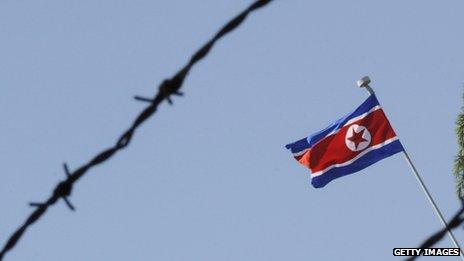
More than 3,500 Westerners visit North Korea every year
The British Foreign Office has said it is considering changing its advice for tourists travelling to North Korea as international tension grows. But what exactly is it like to go on holiday to North Korea - and do people really do it?
With constant surveillance from trained minders, suspicions of bugged hotel rooms and a repeatedly failing power supply, North Korea is unlikely to feature prominently on most tourist wish lists.
But more than 3,500 Westerners visit the enigmatic state every year - and the numbers are said to be increasing.
At more than £1,000 for a typical five-night visit it is not a cheap option. So what exactly is the attraction?
Specialist tour guide Carl Meadows has visited North Korea 15 times in the past eight years.
"The groups are usually well-travelled, open-minded people who have heard a lot about it and just want to see it for themselves," he said.
"Pyongyang is a showcase city. Most people find it fascinating to spend their time in what is one of the most bizarre capitals in the world."
What most foreign visitors encounter is a carefully-arranged snapshot of a secretive republic.
There is little or no hint of the poverty, food shortages and human rights abuses which blight its people.
In fact, tourists in Pyongyang can expect to be well-fed and treated as "guests of the state" - housed in their own hotels and, if needed, treated in their own foreigners' hospitals.
'Like Marbella'
Visits to museums, monuments and beyond are planned with military precision.
Guides and a driver accompany foreigners whenever they leave designated hotels.
But most travel operators say visas are granted freely to any Westerner who is not a journalist.
Father-of-four Andrew Drury, from Surrey, a self-styled "adventure tourist", has travelled with his cousin Nigel Green to dozens of world danger zones, ranging from Mogadishu in Somalia to Iraq.
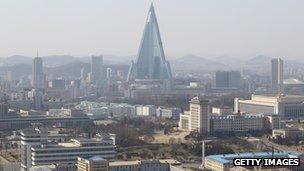
The capital Pyongyang is seen as a "showcase city"
The 47-year-old, who runs a construction business, spent a week in North Korea last year.
"Compared with Mogadishu, which really was dangerous, Pyongyang was like going to Marbella," he said.
"The country is so run down and so poor that it seems a laugh we're worrying about them starting a war. They couldn't keep the power running for more than half an hour.
"I think the hotel rooms are heavily bugged.
"Our security got off the lift on one floor and we carried on up to our rooms. We talked about trying to get out without them, but on our way down the lift stopped at an unmarked floor and they got on - we could never beat them.
"They took away our phones and computers at the border but they didn't understand what an iPad was, so I was allowed to keep it.
"There's no internet, so I couldn't email out, but I showed some of my videos to a woman who was with our security - she didn't even know who the Beatles were."
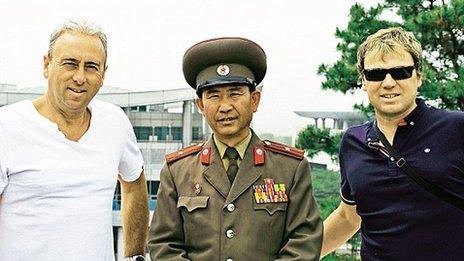
Nigel Green and Andrew Drury attempted to escape their North Korean guides
All tours are likely to include the world's tallest triumphal arch, giant statues of "eternal president" Kim Il-sung and his son Kim Jong-il, and the palace-turned-mausoleum where both of their bodies are on display.
"You see people drawn to tears when they are talking about Kim Il-sung and Kim Jong-il, it's incredibly sincere and 100 per cent genuine," said Mr Meadows, whose employer Regent Holidays takes 300 people a year to North Korea.
"We warn people that they shouldn't say anything negative about the leaders or former leaders because they are treated with real reverence."
Day trips to the demilitarised zone, a heavily-guarded buffer between north and south, are also said to be popular.
Most Westerners tour North Korea in small groups. Specialist tour operators book itineraries and arrange visas with a state tourism body.
Exact numbers are not released, but the number of visiting Westerners has grown steadily ever since North Korea opened its borders to Western tourists in 1987.
Unspoiled countryside
The tourists usually reach Pyongyang by train or plane from Beijing, using state-owned Air Koryo or Air China.
Freedom to roam is surrendered at the border - often along with technology such as phones and laptops.
Mr Drury's tour included a visit, at his request, to a rusting old roller coaster, and a rare couple of hours spent away from the minders.
"We eventually managed to escape them for a while but there really isn't a lot to see," he said.
"Most of the big hotels and buildings over there are empty inside, they're just shells.
"It isn't dangerous. They don't want to be seen as the aggressors. You are given the impression that everybody in the country is happy.
"South Korea is known as an imperialistic American regime where the people will one day be liberated - they really believe that."
Pyongyang has a growing number of restaurants, but the few shops do not welcome tourists.
There is a large central park, where visitors are taken to see residents enjoying picnics.
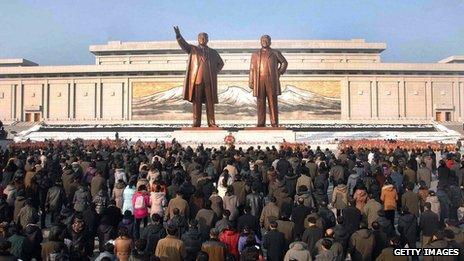
Tours include visits to the statues of Kim il-Sung and Kim Jong-il in Pyongyang
Trips can also be arranged to see unspoiled countryside and the picturesque peaks, lagoons and ravines of the Mount Kumgang region.
Some groups visit universities and schools - pending prior approval - and others time their trips to coincide with national holidays and mass dances or military parades.
"There is a lot to see and a bit of flexibility over where you go but you can't just do your own thing. Everything has to be pre-arranged," Mr Meadows said.
"But you are very well looked after and there is plenty of food.
"The guides are trying to promote the image of a bountiful state and so people are usually quite surprised at the quality."
Danger
Lancashire-based Lupine Travel organises trips to North Korea for between 300 and 400 tourists a year. About a quarter of them are British.
Director Dylan Harris, 34, started the business after finding his own trips to unique tourist spots were impractically expensive and difficult to co-ordinate.
He said: "When I started doing the tours I was aiming at the backpacker market but I didn't really get that audience - it's actually a really wide range of people.
"I've had 18-year-olds through to 85-year-olds. It's curiosity, a lot of people have read about it and they want to see it for themselves."
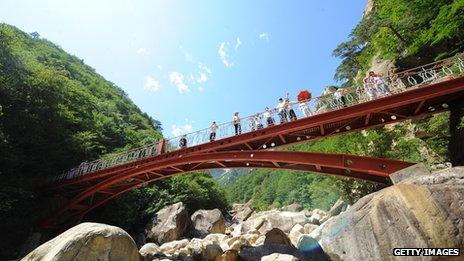
The Mount Kumgang tourist region provides a scenic option
Mr Harris received an email last week from the KFA (Korean Friendship Association), a North Korean government-affiliated organisation, warning about the possibility of imminent war.
But he has stopped short of cancelling trips.
"I've got a group booked to go in five days' time so I have got to make a decision about that," he said.
"I would never let anybody travel if they were going to be in danger, but at the moment I don't think there is any."
And what of the morality in visiting a state which has been repeatedly censured for the way it treats its people?
Nicholas Bonner founded Koryo Tours, the longest-running North Korean tour operator, in 1993.
"I understand the moral question but you have to take a stand and decide if you're going in or not," he said.
"I think it's one of the most rewarding places you can go. It's the fact that you're going into a very different kind of society and seeing one of the least-visited countries in the world."
- Published9 April 2013
- Published9 April 2013
- Published5 April 2013